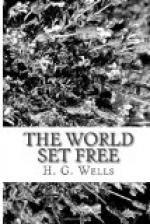‘It seems far enough away now,’ said Edith Haydon.
‘But forty years ago?’
‘No,’ said Karenin with his eyes upon the mountains, ’I think you underrate the available intelligence in those early decades of the twentieth century. Officially, I know, politically, that intelligence didn’t tell—but it was there. And I question your hypothesis. I doubt if that discovery could have been delayed. There is a kind of inevitable logic now in the progress of research. For a hundred years and more thought and science have been going their own way regardless of the common events of life. You see—they have got loose. If there had been no Holsten there would have been some similar man. If atomic energy had not come in one year it would have come in another. In decadent Rome the march of science had scarcely begun.... Nineveh, Babylon, Athens, Syracuse, Alexandria, these were the first rough experiments in association that made a security, a breathing-space, in which inquiry was born. Man had to experiment before he found out the way to begin. But already two hundred years ago he had fairly begun.... The politics and dignities and wars of the nineteenth and twentieth centuries were only the last phoenix blaze of the former civilisation flaring up about the beginnings of the new. Which we serve.... ’Man lives in the dawn for ever,’ said Karenin. ’Life is beginning and nothing else but beginning. It begins everlastingly. Each step seems vaster than the last, and does but gather us together for the nest. This Modern State of ours, which would have been a Utopian marvel a hundred years ago, is already the commonplace of life. But as I sit here and dream of the possibilities in the mind of man that now gather to a head beneath the shelter of its peace, these great mountains here seem but little things....’
Section 6




